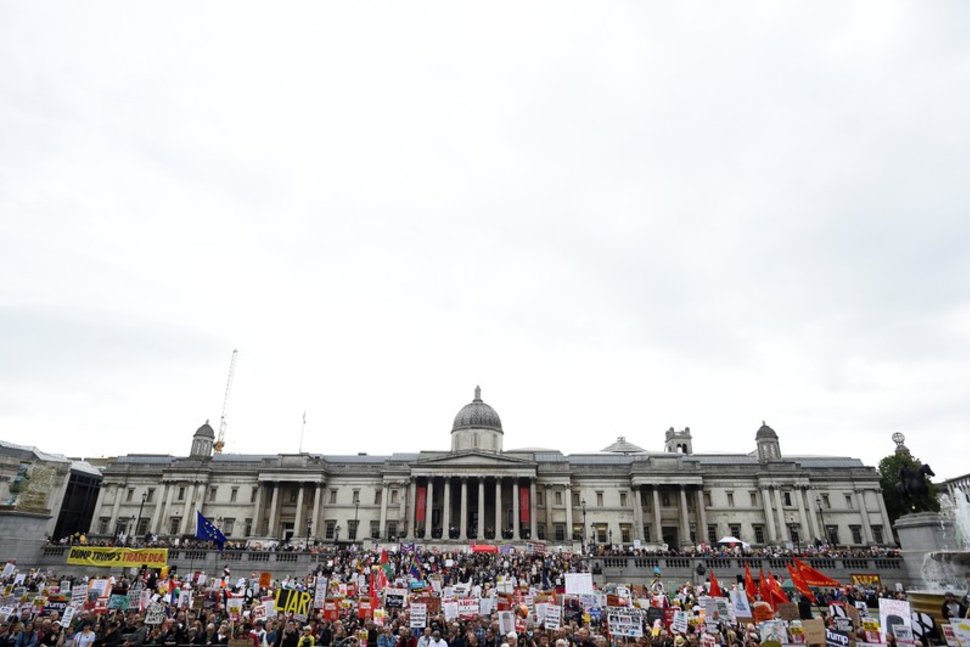LONDON, (Reuters) – U.S. President Donald Trump waded into Britain’s political crisis yesterday by telephoning Boris Johnson, the Brexit-supporting favourite to succeed outgoing Prime Minister Theresa May.
Feted by Queen Elizabeth on the first day of his state visit to Britain, Trump turned to politics today, offering to meet Johnson, a former foreign minister who has said the United Kingdom should leave the EU on Oct. 31, deal or no deal.
Even before Air Force One landed on British soil, Trump praised the main leaders of Brexit – Johnson and Nigel Farage – and his advisers called on Britain’s next leader to block Huawei from the next generation mobile phone technology.
Trump today called Johnson and offered a one-to-one meeting but Johnson declined the invitation as he had to focus on meeting Conservative Party lawmakers who will vote on who they want to be the next prime minister, a source said.

The president understood the situation and said he looked forward to catching up at a later date, the source said. Their call lasted for around 20 minutes, the source said.
Trump earlier promised Britain a substantial post-Brexit trade deal, joking to May that she should stick around to clinch it though she is due to step down in two days’ time.
“We’ll have a very, very substantial trade deal, it’ll be a very fair deal, and I think it’s something we both want to do,” Trump told May at a meeting in St James’s Palace, a 500-year-old official residence of the monarch.
The state visit, promised by May back in January 2017 when she became the first foreign leader to meet him after he took office, is cast as a chance to celebrate Britain’s “special relationship” with the United States, boost trade links and reaffirm security cooperation.
But the collapse of May’s premiership over Brexit and Trump’s penchant for ignoring the conventions of modern diplomacy have made the trip one of the most unconventional state visits in recent British history.
Ahead of the visit, Trump praised Johnson, saying he would make a “very good” prime minister, and advised a sharp exit from the European Union on Oct. 31 with or without a deal.
Trump also called for arch-Brexiteer Farage, a scourge of May’s ruling Conservative Party, to conduct talks with the EU.
BREXIT, BLIMP AND CHINA
Brexit is the most significant geopolitical move for the United Kingdom since World War Two and if it happens, London will be more reliant on the United States as ties loosen with the other 27 members of the EU.
Huawei will top talks in London after the British government appeared to defy Trump administration demands and allow the Chinese company a limited role in building 5G networks.
“We’ve been clear: Our ask is that our allies and our partners and our friends don’t do anything that would endanger our shared security interests or restrict our ability to share sensitive information,” U.S. Secretary of State Mike Pompeo said.
The Trump administration has told allies not to use Huawei’s 5G technology and equipment because it fears that would allow China to spy on sensitive communications and data. Huawei denies it is, or could be, a vehicle for Chinese intelligence.
Notwithstanding Britain’s enduring alliance with the United States, some British voters see Trump as crude, volatile and opposed to their values on issues ranging from global warming to his treatment of women.
A giant inflatable blimp depicting Trump as a pouting baby in a diaper was raised outside the British parliament in London on Tuesday ahead of what is expected to be one of the city’s largest protests against a foreign leader.
“We’re trying to remind the president how unwelcome he is in this country,” said Leo Murray, the co-creator of the blimp. “Donald Trump is childish, trivial, insulting. He embodies all of these things. This is an incredibly apt way to welcome him.”
Thousands of people protested in central London against Trump, but numbers were far down from the tens of thousands who gathered to oppose his visit last year.
Protesters waved witty and sometimes rude placards at a what organizers called a “Carnival of Resistance” in Trafalgar Square while Prime Minister Theresa May was in talks with the president a short distance away in Downing Street.
There was a festival atmosphere at the rally, which will be addressed later by Jeremy Corbyn, the socialist leader of Britain’s opposition Labour Party. Trump supporters said Corbyn’s participation was an insult from the leader of Britain’s main opposition party.









